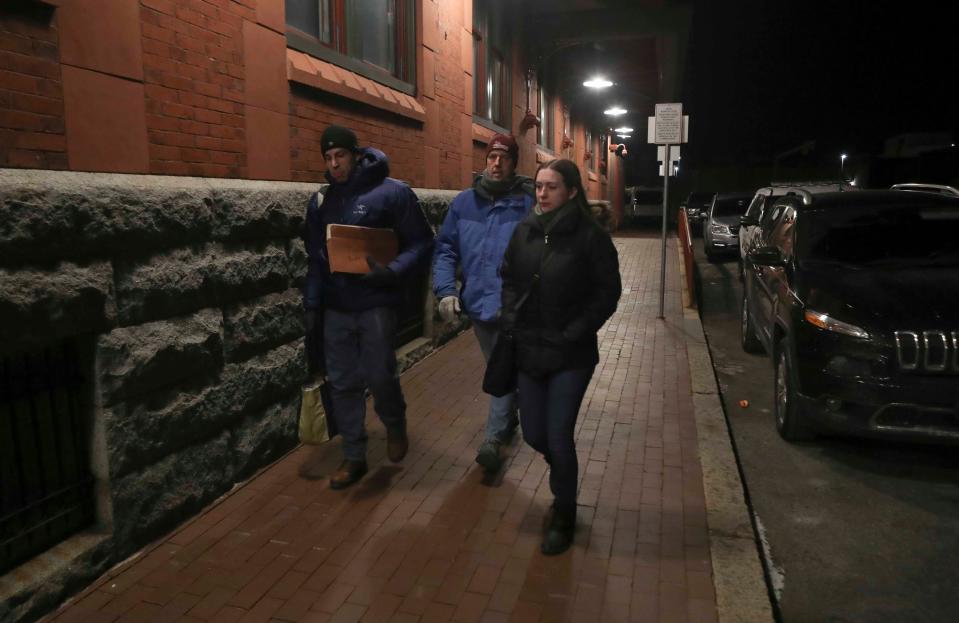Accused of begging inside Market Street restaurants, she was jailed for a year
She was living on the street. A court had reason to believe she was suffering from mental illness.
And though she was never convicted, the state imprisoned her for an entire year after she was accused of crimes tied to repeatedly begging inside two upscale restaurants on Market Street in Wilmington.
Prompted by restaurant staff, Wilmington police arrested the woman in April 2022 on low-level charges that carried the potential for no more than a month of imprisonment combined.
She was freed the same day under the condition that she not set foot on a 12-block stretch of Market Street downtown, where the city's branding efforts often clash with those living in poverty around it.
Later that day, police spotted her walking down the sidewalk on Market Street. She was charged with violating the terms of her release and locked away in Baylor Women's Correctional Institution. She remained imprisoned for a year.

“It’s like I was lost in the system,” the woman said through tears. “It was so lonely.”
Delaware Online/The News Journal is not publicly identifying this woman given the nature of her crimes and to protect her identity while explaining what happened when a person who needed Delaware’s support systems landed in the state’s criminal justice system.
Ultimately, she was imprisoned more than 10 times longer than the maximum sentence for the original charges tied to begging inside the restaurants − far longer than others with comparable charges, her attorney argued.
The reasons why are complicated. They involve the legal maneuvers used by Wilmington Police against individuals that cause what one local court official described as persistent “discomfort and problems” for others on Market Street. They also involve her rights clashing with the court's efforts to tie her freedom to medicated treatment that she feared.
Everyone involved in the case argued they were either representing her best interests or the interest of public safety. But she became snarled in a system that could only manage to prolong her imprisonment before casting her back onto the street.
Elizabeth Jaconi, the woman’s attorney, said in an “ideal situation” the woman would have received services in the community instead of being locked up. She also acknowledged that this case was complicated.
“At the end of the day, incarcerating people just so they are no longer in the public’s eye and disturbing people on Market Street should not be the answer,” said Jaconi, a longtime public defender. “Delaware needs to find the resources to take care of these people better.”
Stephen Metraux, the director of the University of Delaware’s Center for Community Research and Service, reviewed transcripts detailing the woman’s court case and said it illustrates that Delaware − and society more generally − does not allocate resources to adequately respond to the needs of some people and so they become a “problem of the legal system.”
“This is a woman who falls through the cracks of the mental health system in Delaware and that is essentially why she is being incarcerated,” said Metraux, who has decades of experience in research and policy work involving homelessness.
He added the criminalization of issues derived from poverty and mental illness only deepens the individual’s health and legal problems, is expensive for taxpayers, and serves only to remove them from public sight temporarily.
“It is a mismatch of needs and responses,” Metraux said.
Prosecutors in the office of Delaware Attorney General Kathy Jennings pursued the case against the woman for a year. They dropped the charges in May when her defense attorney asked the judge to dismiss the case, arguing the state had failed to actively prosecute the case as the woman remained locked up.
In a written statement, Mat Marshall, a spokesperson for Jennings, blamed the situation on the woman's unwillingness to cooperate with the court's attempts to help and insisted that “any prosecutor in the country would have made the same decisions.”
At the same time, he also pointed to a “real deficit in options – which the criminal justice system has no power to remedy.”
Banned from Market Street
In an interview, the woman described the pressure of waking up outside every morning knowing she would not eat if she didn’t ask others for help. Tears ran down her cheek as she calmly recounted cutting herself while rummaging through a dumpster for food.
“I didn’t know what to do,” she said. “It’s so hard just living these days.”
It was a Tuesday afternoon in April 2022 when an officer from Wilmington Police Department's Special Operations Division was dispatched to the Farmer and the Cow restaurant, an upscale burger bar on Market Street, according to an officer’s statement describing the investigation.
The owner of the restaurant told police that a woman kept coming into the restaurant that day and days prior, asking patrons and staff for money and food she "did not want to pay for," according to the narrative penned by the investigating officer.
The owner told the officer the woman became "hostile and aggressive" when asked to leave, "using profanity" and "causing a scene," and threatened to strike someone, according to court records.
The next day, the officer learned that the same woman had also entered Bardea, Market Street’s fine-dining darling two blocks from the burger bar.

In an interview, the woman recalled resisting her ouster from one of the restaurants because a patron was reaching to hand her money when staff commanded them to reject her. She denied characterizations that she was dangerous.
The officer wrote that staff at Bardea told him the woman had been "begging patrons for money, acting loud and disorderly, had refused to leave and had returned multiple times on Tuesday."
Around 9:30 the same morning the officer learned of the Bardea intrusions, police saw her walking on 7th Street and arrested her.
She was charged with two counts of third-degree criminal trespass, which may be punished only by a fine and probation. Additionally, she was charged with misdemeanor disorderly conduct, which carries a maximum of 30 days imprisonment.
She was taken to court and released on the condition that she have "no contact" with Market Street from Martin Luther King Boulevard up to 12th Street. Later that afternoon, an officer encountered her walking on Market Street.
“I begged him to let me go,” she said, recounting telling the officer she would not return.

She was charged with non-compliance with the terms of her release, a misdemeanor that carries a maximum of one year in prison. Unable to afford bail, she was locked up in Baylor.
According to Alan Davis, the top magistrate in the court that approved the woman’s ban from Market Street, such bans are part of a strategy used by Wilmington Police to target individuals that they deem a persistent problem on that corridor.
In most criminal cases, pretrial no-contact orders are typically focused on specific places or people, like victims of or witnesses to the crime.
But as employed on Market Street, this strategy allows police − with the approval of a court − to prolong pretrial incarceration and multiply the potential prison sentence for individuals arrested on low-level charges that return to the city’s popular downtown corridor.
In the woman's case, her presence on Market Street added a year to the 30-day potential imprisonment she faced for her conduct in the restaurants.
A special court takes over
People who are convicted and sentenced rarely receive the maximum punishment allowed by law, particularly when they, like the woman, have no local criminal record. But the woman was never even convicted.
Her case didn't get to that stage because the court had reason to question whether she was mentally competent to participate in the criminal proceedings against her.
People charged with crimes must have the ability to understand and assist with their defense in the court proceedings against them. When there is a question raised about that competency, the court may order an evaluation, which is conducted by a professional at the Delaware Psychiatric Center, the only state-run psychiatric facility in Delaware.
Two months into the woman’s imprisonment, the court ordered an evaluation, and her case was moved to the Court of Common Pleas Mental Health Court.
That’s a court where the judge, prosecutors and public defenders try to work together to resolve cases through plea bargains, release orders and case dismissals meant to emphasize court oversight of treatment more than time behind bars.
As of August, there were 73 people in the Court of Common Pleas Mental Health Court, which primarily handles misdemeanors. Public defenders who work in that court said it is not uncommon for defendants to be incarcerated at some point in their case and many have similar needs to those presented by this woman.
RECENT: How the Wilmington Housing Authority plans to use a nonprofit to create affordable housing
After delays tied to staffing issues at DPC, the woman’s competency evaluation report was delivered to the court in September, five months into her imprisonment. The evaluator’s notes are not public documents but are excerpted in other public court documents. Transcripts of her case hearings also include details from the report.
The evaluators wrote that they could not form an opinion to a reasonable degree of medical certainty because the woman left the evaluation before it could be completed. The evaluators wrote that she appeared “disoriented” and her thoughts “illogical as she made bizarre statements throughout the encounter,” according to portions cited by prosecutors in written statements.
The evaluators also wrote that “having considered the interview and the patient’s records, it seemed unlikely that (the woman) would be able to interact with her attorney in a productive manner and participate in court proceedings.”
The evaluator also cited a “degree of irritability, impatience and poor impulse control,” contributing to that opinion, according to prosecutors’ statements.

“I have serious concerns about her ability to assist in her defense due to mental illness,” the report states.
In one hearing, a prosecutor discussing her case referenced potential treatment for schizophrenia.
In an interview, the woman said she suffers from depression and that attempts to characterize her as “crazy” were a “lie.”
A lack of trust
In the six months after that report was issued, there was no formal declaration by the judge that the woman could not stand trial − but the case stagnated.
There were four hearings, about once a month. The first few primarily centered around the judge and defense counsel discussing ways to get the woman out of prison and into some sort of housing and treatment as a condition of pretrial release or resolving the case.
By December, she had been locked up for six months and the court for the first time discussed the evaluator’s opinion. Her public defender was already pressing for release, arguing that the woman had been incarcerated for far more time than had she been offered a plea comparable to other cases with similar charges.
Court officials did not respond to an email seeking comment on the woman's case. The presiding judge is quoted in this story from transcripts of hearings in the case.
“I'm not going to release her to homelessness in the streets,” said Court of Common Pleas Judge Katharine Mayer.
Jaconi, the defense attorney, told the court that the prison’s reentry services couldn’t nail down a place for her to live without a specific date that she’d be released. Mayer emphasized that if the woman wasn't given “treatment” and “supervision,” she was likely to “panhandle” and be arrested again.
“My goal is to treat and not incarcerate,” Mayer told Jaconi.

She instructed Jaconi to follow up with prison officials and she told prosecutors to consider the length of the woman’s incarceration and a potential conditional dismissal of the case that requires her participation in treatment.
A month later, in January, Jaconi told the court that Department of Correction reentry services were “backed up” due to attrition in the department and that the one worker in that area who built some rapport with the woman had left the department, according to a transcript.
A regular theme of the court discussions is the difficulty attorneys and correction workers had communicating with the woman. In a written statement, a DOC spokesperson said reentry officials “actively engaged” with her.
As the woman remained incarcerated longer and longer, she began an assessment process used by the state to evaluate people to connect them to housing and treatment services, according to statements made in court. Jaconi told the court the woman withdrew because she perceived that help may also require her to be medicated.
“She feels she doesn’t need it, as with most people with mental health issues,” Jaconi told the court.
People suffering from mental illness commonly do not perceive that.
Metraux, the University of Delaware expert, said this disconnect emphasizes the importance of engaging people in the woman’s situation with mental health workers and homeless services workers who can first build a relationship and then connect an individual to resources.
“Over time they build trust,” Metraux said. “That is particularly difficult in Delaware because in New Castle County, there are very few outreach workers.”

Building a relationship is made more difficult when the person who needs help is being locked behind bars, he said.
Jail and prison may in some cases have the benefit of temporarily stabilizing a person by providing some basic needs, but incarceration is not a therapeutic setting and over time, tends to make mental health problems worse, Metraux said.
In an interview, the woman said she was forced by prison officials to take a medication that is used to treat symptoms of schizophrenia, describing it as traumatizing.
The court never pursued medicating her against her will. But Delaware Department of Correction rules do allow for the involuntary administration of psychotropic medication by prison officials for prisoners with “serious mental illness” in both emergency and non-emergency situations through a process that requires approval or oversight from a corrections healthcare committee.
“I felt deranged,” the woman said. “It really messed me up.”
As her case played out in court, she wasn't there and relied on periodic updates from her defense attorney.
“I kept asking, ‘What is going on?” she said in an interview. “It’s like they threw away the key on me.”
It is unclear whether state support systems could have allowed her supportive housing without the strings of medication attached.
RECENT: On this forgotten Wilmington street, new single-family homes are coming. Who's eligible?
Stalemate
As her case came to a head, prosecutors and the court were adamant that treatment needed to be part of any release.
In January, Deputy Attorney General Ipek Kurul, the prosecutor, emphasized the need for the court to order another evaluation so the case could move forward and so the parties could try to develop a path that would lead the woman not to "re-offend." There was discussion over how she didn't cooperate with the first evaluation and another was not ordered.
At one point, the judge suggested prosecutors consider civil commitment, a separate court process by which the state can order someone be housed and treated at DPC. It requires evidence the person is a danger to themselves or others.
In court, Jaconi said that may be more appropriate than continuing the woman’s indefinite incarceration, but she questioned whether the woman would meet the criteria because she hadn’t shown herself to be dangerous.
Kurul told the court they were considering civil commitment. Ultimately, Department of Justice officials decided against initiating that process for reasons they could not comment on.
In defending their handling of the case, prosecutors pointed toward the woman's unwillingness to participate in treatment and characterized her as dangerous, citing a criminal record in other states.
They said her record outside of Delaware includes arrests for charges like assault, battery and robbery. It also includes crimes that are typically charged against people without a home. Prosecutors could not say whether any of the arrests resulted in convictions.
In court hearings, the prosecutor emphasized the need for treatment so the woman doesn’t “reoffend,” but they did not characterize her to the court as violent.
Metraux, the University of Delaware expert, noted that the threat of violence attached to people without a home or with mental illness is often exaggerated and, statistically, someone in the woman’s position is far more vulnerable to falling victim to violence instead of the other way around.
Eventually, in March, Kurul asked the court to order the woman into DPC custody for what’s known as competency restoration. In that process, people deemed not competent to stand trial are ordered into treatment in the hope they will be able to comprehend their future court hearings.
Competency restoration often takes months and can be a fruitless effort when people’s mental illnesses are intractable. The expert who evaluated her issued doubts over whether competency restoration would be useful but recommended it if the court felt she was dangerous.
In the March hearing, Jaconi emphasized that it was too late in her incarceration to begin such a process and argued prosecutors could have done so in September, according to the transcripts. Mayer, the judge, said the woman should not benefit from having the case dropped simply by not cooperating with evaluations or intentions to release her on the condition she accepts treatment.
“I would argue she is not benefiting,” Jaconi told the judge. “Had she not been mentally ill, she wouldn’t have served a day in jail.”
Mayer predicted an "endless cycle."
In the March hearing, Kurul’s request that the court order competency restoration prompted Jaconi to call for what’s known as a prima facia hearing.
This hearing requires the state to show the court they have the required testimony and evidence to try a case in front of a jury and typically involves calling witnesses to court to testify in front of the judge. It is meant as a safeguard to a person's rights because competency restoration can involve court-ordered medications and treatment that some, like the woman, may not want.
A date for the hearing was set for April. On the day of the hearing, the prosecutor told the court the hearing wasn't going to happen. Both the judge and Jaconi seemed confused, according to the transcripts.
Kurul stated that she had “looked at the entirety of the record,” thinks the woman's ability to be restored is “very, very poor” and instead of keeping the woman incarcerated, it may be better to release her with the provision that she participates in outpatient treatment, according to transcripts.
Jaconi, again, stressed that the woman would not consent to being medicated.
Seemingly out of options, the judge suggested Jaconi enter a motion to dismiss the case. The motion was filed on May 3, after the woman had spent more than a year in prison.
The motion accused prosecutors of failing to actively prosecute the case from the start and after the competency report was issued in September. Days later, prosecutors dropped the charges and the woman was released.
Department of Corrections officials gave her a ride to a homeless shelter.
The revolving door
Living on the street in July, she was again arrested after causing a scene while begging for food and money in restaurants on Market Street. She was charged with loitering, disorderly conduct and possessing an open beer can, according to court documents, and was also banned again from Market Street.
In August, she was charged again when an officer claimed that he saw her expose herself while cleaning blood from her period with a napkin as she sat on the curb in front of the Wilmington Library at 10th and Market streets. He shouted and she bolted, according to the officer’s affidavit.

About two weeks later, she was arrested again for being inside the Sheraton Hotel on Delaware Avenue after being told to leave. She was charged with criminal trespass for her repeated presence in the hotel, as well as lewdness and a violation of her latest Market Street ban for the incident in front of the library.
She said she went into the hotel to get free water meant for guests.
In her first interview with Delaware Online/The News Journal, she was back in prison, in a separate room from the reporter, separated by a plexiglass wall and picking at the handcuffs applied for the interview.
When asked what help she felt she needed and would accept, she said it sounded crazy, but “maybe a credit card to have a hotel room for a year to figure things out.”
She said she needed identification and didn't recall the last time she had that. She felt she could hold down a cashier position somewhere.
She said when she gets out, she hopes to come across a social services worker who was "nice" to her on the street.
At the same time, she lamented the waste of both food and other goods she sees when some are struggling for anything and she fears that people don't want to help her.
“They need to know," she said, "I am a person here too.”
Contact Xerxes Wilson at (302) 324-2787 or xwilson@delawareonline.com.
This article originally appeared on Delaware News Journal: Begging inside Wilmington's Bardea lands woman in jail for year

